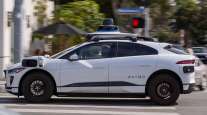How a Billion-Dollar Autonomous Vehicle Startup Lost Its Way

Quanergy Systems Inc. found itself in the center of a sudden frenzy over self-driving cars in 2014. It makes lidar, which bounces lasers off objects to help autonomous cars know what is nearby. That September, the fledgling company announced a partnership with Mercedes-Benz that would put its devices on cars the automaker was using to test autonomous driving features. The deal established an enviable partnership with one of the world’s most prominent auto brands. In January 2015, the companies showed off a Mercedes E350 sedan outfitted with Quanergy’s lidar devices at the Consumer Electronics Show in Las Vegas.
At the time, the lidar industry was dominated by Velodyne Lidar Inc., which provided the bulky, expensive sensors Google was using on its autonomous cars. Quanergy made the kind of promise Silicon Valley was built on: It would shrink existing hardware through science, then sell it at a fraction of the price. Quanergy led the pack, as investors poured money into companies describing new techniques for lidar devices. It has raised $160 million to date at a peak valuation of more than $1.5 billion. Last fall, Quanergy began talking to banks about a potential IPO, setting it up to be one of the first public companies to emerge from the wave of firms making tech for autonomous vehicles.
This July, Daimler AG, the parent company of Mercedes, made another announcement. Daimler said it was running a test program for autonomous vehicles on urban streets in the Bay Area, which included a handful of partners, none of which was Quanergy. For lidar, the robo-taxis would use Velodyne. Daimler declined to comment on its relationship with Quanergy.
.@Quanergy CEO, Louay Eldada, presents to a full house at Sensors Expo. pic.twitter.com/U8UL2MCOpf
— Quanergy Systems (@quanergy) June 28, 2018
It was a troubling sign for the lidar industry’s first unicorn — and it wasn’t the only one. Quanergy has struggled to deliver products along the timelines it has set out for itself and has shipped devices that don’t work as well as advertised. Numerous employees have left over the past 18 months, including several at key positions. But Quanergy’s biggest challenge is that its autonomous car business hasn’t developed the way it thought it would. The company has increasingly focused on other applications for lidar, including a plan to help build a digital border wall along the Mexican border, a project that has left some employees ill at ease.
Quanergy has stopped talking about an IPO and has been pursuing new investments in recent months. It has had talks about finding a buyer, according to people with knowledge of the situation. Quanergy backers Samsung Ventures and Sensata Technologies Holding, an auto sensor maker, have expressed disillusionment with the startup, according to people familiar with those firms.
Sensata spokeswoman Alexia Taxiarchos said the company remained excited about Quanergy.
“Developing these lidar sensors involves solving difficult technical issues that take time to overcome,” she said.
In an e-mail, a spokeswoman for Samsung’s investment managers said the firm believed Quanergy was ahead of its competitors making lidar for cars and had shown meaningful results in the security sector. She said Samsung was aware that Quanergy was about to close a new funding round. In an e-mail, a spokeswoman for Quanergy said it “unequivocally denied” that it was seeking a buyer.
In August, Louay Eldada, the company’s co-founder and CEO, invited Bloomberg News to visit his headquarters and assembly line, which he says is capable of shipping a million lidar devices a year. In a sweeping interview, Eldada admitted faults with earlier products that have since been corrected, cast some criticism as broadsides from competitors and insisted that automotive partners remain optimistic about Quanergy. “People understand we are the real deal,” he said. “We are the veterans.”
The company also demonstrated its latest technology to a reporter, although only in controlled conditions that didn’t replicate the needs of automotive companies.
Eldada denied that there were problems with Quanergy’s relationship with its investors or with Daimler, and added that Quanergy was “one of the finalists” to provide the carmaker with lidar going forward. Quanergy has more than 5,000 customers, according to Eldada. He said he couldn’t name them for competitive reasons.
Quanergy is seeking new capital, and Eldada said about a third of the investment would come from China. He declined to name the potential investors. Asked if Samsung and Sensata would participate in a new funding round, he said, they had “grabbed all they intended to grab.”
Bloomberg also spoke to a half-dozen former employees, all of whom asked to remain anonymous, most of them citing the fear of retaliation. They said execution was a consistent problem at Quanergy. Several former employees described Eldada as a combustible and intimidating presence, stymying debate about product development and seeing any disagreement as intolerable dissent. When asked about this, Eldada pointed to a framed placard listing the firm’s core values, which include teamwork, transparency, intellectual honesty and empowerment. “You will find that the level of happiness is high,” he said.
Bloomberg News also spoke to current and former business partners, as well as more than a dozen people in the industry, who also described signs of trouble at the company. Most asked to remain anonymous to speak frankly about sensitive business arrangements.
Quanergy’s critics said the distance between its rhetoric and reality has widened. One former employee said he never saw a single device come off the line at Quanergy that met all of its stated specifications, an allegation the company denies. Morale has been flagging for well over a year, said several former employees who are in contact with current staff members. In July, Ryan Field, a senior employee who was in charge of Quanergy’s development of a chip designed specifically for lidar, told the company he was leaving. Eldada described Field’s departure as a blow, but said it was amicable. Field declined to comment.
With assistance from Gabrielle Coppola, Alex Barinka, and Masatsugu Horie




